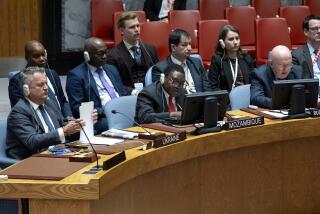China Ratifies U.N. Accord on Human Rights
- Share via
BEIJING — China’s highest legislative body ratified an international human rights treaty Wednesday but left open the possibility of striking out a key provision of the accord.
The standing committee of the National People’s Congress approved the International Covenant on Economic, Social and Cultural Rights, the official New China News Agency reported in a brief statement. The ratification comes four years after China signed the treaty, one of two U.N. accords guaranteeing a host of civil rights.
The endorsement coincided with the end of a visit here by United Nations human rights chief Mary Robinson, who criticized the Communist regime for its suppression of the Falun Gong spiritual movement.
An annual State Department report this week also rebuked China for human rights abuses. The Bush administration has announced its intention to sponsor a U.N. resolution censuring Beijing for its poor rights record.
The Chinese government categorically rejects such criticism. But it is eager to burnish its image as it lobbies hard for the right to host the 2008 Summer Olympics. International Olympic Committee inspectors visited Beijing last week to check out the Chinese capital, which lost a previous Olympic bid partly because of concern over human rights.
The U.N. covenant enshrines workers’ rights to fair labor practices, medical care and education. Significantly, it guarantees the right to strike, a sensitive issue for the Chinese government, which is facing more labor unrest than ever as state-owned enterprises go bankrupt and throw millions of people out of work.
In 1999, Chinese officials logged more than 120,000 labor disputes. The potential for more unrest is likely to grow after Beijing officially joins the World Trade Organization, a move expected later this year.
Significant in Wednesday’s ratification was wording by the government that appeared to let it skirt a provision allowing the formation of independent unions. The standing committee said it would implement the provision in accordance with China’s constitution and work laws, which ban any labor organization outside the official All-China Federation of Trade Unions.
That exemption, or “reservation,” would make China’s commitment fall short of what many human rights advocates had sought.
“We strongly urged the Chinese government to ratify the whole [treaty] without the reservation. From our perspective, this is very important,” said Apo Leung of the Asia Monitor Resource Center, a Hong Kong-based group that tracks labor issues on the mainland.
“A serious reservation on Article 8 [of the treaty] would be extremely disappointing and would take from the sense of a real step forward,” the U.N.’s Robinson told reporters Tuesday.
Activists also worry that China might not fully comply with the demands of the accord. China has already passed laws mandating fair labor practices, but enforcement has been spotty.
China’s leaders must “live up to their promise. Signing a paper is not worth anything,” said Leung, who called for international pressure on Beijing to keep its word. “The government makes declarations, but they mean nothing.”
Still outstanding after Wednesday’s approval is a second, more stringent U.N. covenant guaranteeing political and civil rights, including the right to form opposition parties. There are no indications as to when Beijing might ratify that accord.
More to Read
Sign up for Essential California
The most important California stories and recommendations in your inbox every morning.
You may occasionally receive promotional content from the Los Angeles Times.














